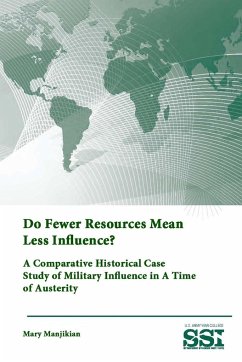In the 2014 Quadrennial Defense Review, military planners speak at great length about the importance of rebalancing our armed forces. As a result of the Budget Control Act of 2011, our U.S. Armed Forces have absorbed significant budget cuts, which are projected to continue into 2016. Not surprisingly, a major theme of the Quadrennial Defense Review is the necessity of making tough choices in a period of fiscal austerity.1 As Dr. Manjikian's analysis points out, however, many of the themes raised by policymakers, military analysts and the general public in relation to this new politics of austerity are not actually new. Rather, such conversations have taken place at the end of U.S. military actions after the Korean War, in Vietnam, and at the end of the Cold War.
Hinweis: Dieser Artikel kann nur an eine deutsche Lieferadresse ausgeliefert werden.
Hinweis: Dieser Artikel kann nur an eine deutsche Lieferadresse ausgeliefert werden.








